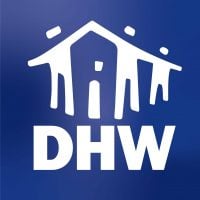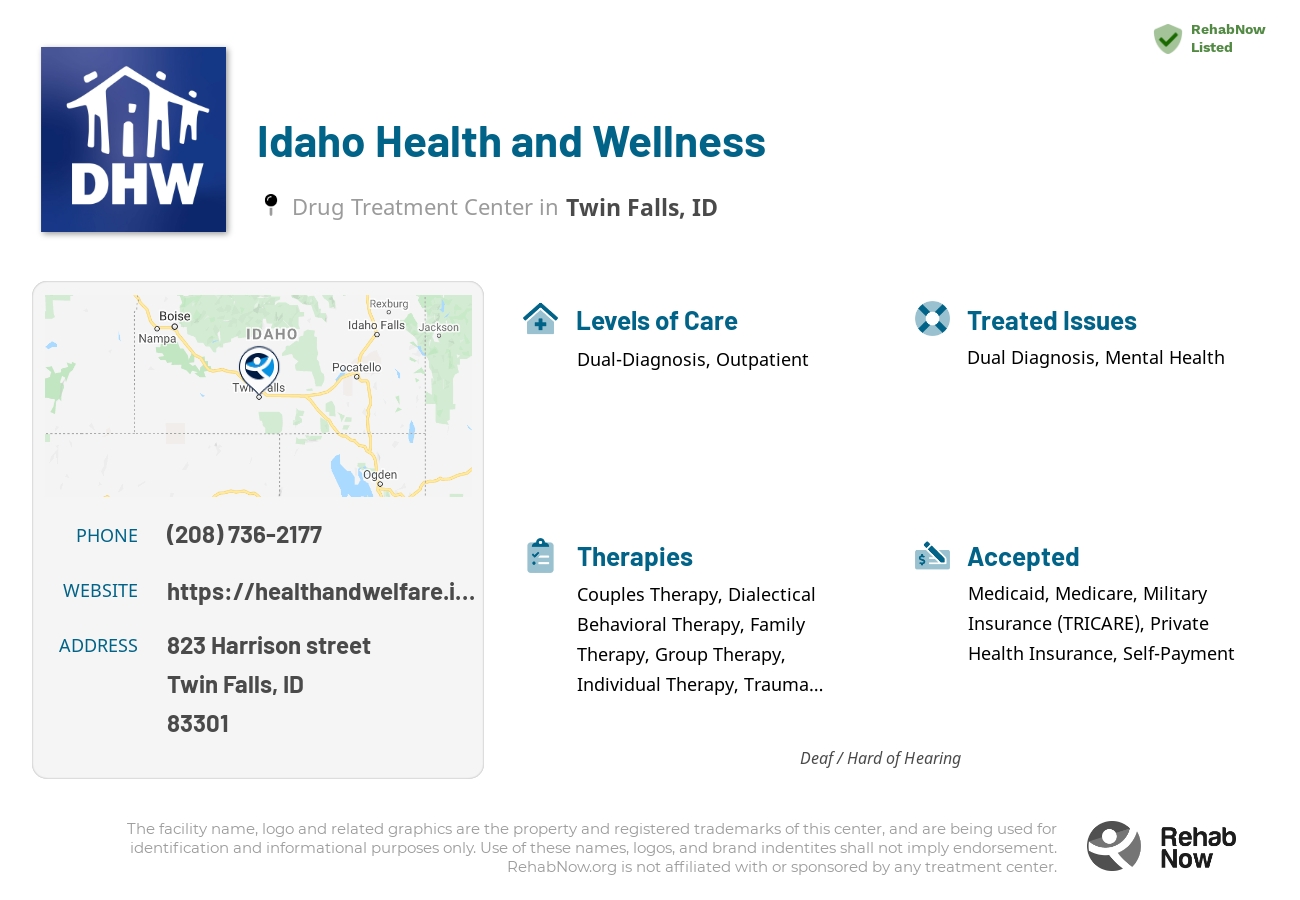Idaho Health and Wellness
Drug Rehab Center in Twin Falls, Idaho
Idaho Health and Wellness is an addiction and substance abuse treatment facility in Twin Falls that offers personalized and comprehensive outpatient services, including evidence-based practices like medication-assisted treatment and psychotherapy, to promote long-term recovery.
About This Idaho Facility
Idaho Health and Wellness in Twin Falls, Idaho, is an addiction and substance abuse treatment facility offering comprehensive and comprehensive outpatient services. They provide a full range of mental health and substance abuse services, including evidence-based practices such as medication-assisted treatment and psychotherapy. They also provide support groups, education, and relapse prevention strategies to help individuals break free from the cycle of addiction.
At Idaho Health and Wellness, their focus is on curating the best treatment plan suited for each person’s needs. Their goal is to holistically and thoroughly address the underlying components of addiction and promote long-term recovery. They employ specialized psychotherapies such as Dialectic Behavioral Therapy (DBT), Cognitive Behavioral Therapy (CBT), and Psycho-Education to aid in the healing processes. In addition, they offer MAT, or Medication-Assisted Treatment, to help reduce cravings and ease the medical aspects of detoxification.
Idaho Health and Wellness provides state-of-the-art care tailored to each person and has achieved accreditation from The Joint Commission. In addition, they are licensed by the Department of Health and Welfare (DOHW) and the Substance Abuse and Mental Health Services Administration (SAMHSA). The facility is staffed with highly-trained professionals and certified addiction counselors and is focused on providing only the best evidence-based practices to those with addiction.
Genders
Ages
Modality
Additional
Conditions and Issues Treated
When addiction and psychiatric issues co-occur, the addict’s recovery is more successful when both conditions are treated. A dual diagnosis refers to a condition in which the patient is diagnosed with two health issues: addiction and bipolar disorder. The most common therapies are psychotherapy, behavioral therapy, spiritual counseling, 12-step programs, and medication management.
Levels of Care Offered at Idaho Health and Wellness
This center offers a variety of custom treatment tailored to individual recovery. Currently available are Dual-Diagnosis, Outpatient, with additional therapies available as listed below.
An outpatient treatment program is set up to help with alcohol or drug addiction or a co-occurring disorder. The patient must attend the facility for their therapy and other programs but can return home each night.
The frequency of mandatory attendance decreases after much of Idaho Health and Wellness‘s program is complete.
Outpatient treatment is a recovery approach that allows recovering addicts to live at home while getting rehab for addiction
An outpatient can include day treatments which include attending group sessions one hour per week. A person living in an outpatient environment may be allowed the opportunity to work full time if they choose to and continue studies without interruption from drugs/alcohol.
Outpatient treatment is an option for people who want to maintain their careers and families. Outpatients live at home but attend treatment such as individual counseling, group counseling, or twelve-step meetings during the day.
Therapies & Programs
At Idaho Health and Wellness , to learn from past mistakes and improve one’s situation, the recovering person meets individually with a therapist. The counselor or therapist will address addiction causes, triggers, mental issues, dual diagnosis, and aftercare plans during this time. This is a very intense and challenging process. Some clients find it easier to open up to someone other than family or friends who understand their struggles with addiction.
Couples therapy sessions are typically used to help couples in recovery from drug addiction work through their issues. These types of sessions can be beneficial for many reasons, including the fact that they add a layer of accountability when both partners in a couple are recovering from addiction.
Therapy can also provide addicts with another effective way to cope with stress and avoid relapse during difficult situations. This type of therapy can help improve communication with their partners, which can strengthen the relationship and prevent future problems that might lead to relapse.
Family therapy is a crucial part of drug treatment and getting sober. It is one of the most effective ways to help addicts stay on the path to long-term sobriety. An addict’s family can play a vital part in helping them to avoid relapse. They can spot the warning signs and help them get back on track.
In group therapy, recovering addicts meet with a therapist and other people in recovery. Some groups are closed, meaning only people who share the same addiction or problem can attend. Others are open to anyone who wants to stop using drugs or drinking alcohol. Group therapy sessions typically focus on one topic each week or month so that recovering addicts can discuss issues they face daily.
Trauma therapy allows people to face and learn from past traumas.
Many people suffer childhood traumas that lead to adult addiction. During treatment at Idaho Health and Wellness [/type], you can move forward in your recovery and reclaim your sober future! Trauma is a common cause of psychological disorders like Addiction Disorder. It’s common in Addictive Disorders patients because traumatized people have strong emotions or thoughts that lead to addictive behaviors.
Dialectical Behavior Therapy (DBT) is a type of therapy created in the late 1980s and early 1990s. It was designed to help people with high rates of suicidal behavior.
The goal of DBT is to teach mindfulness, distress tolerance, emotion regulation, and interpersonal effectiveness to help people learn how to live a life that is no longer controlled by overwhelming emotions and urges.
DBT is beneficial in treating drug addiction because it helps patients understand and cope with their cravings for drugs or alcohol rather than turning to those substances as a way of coping.
Cognitive Behavioral Therapy (CBT) is based on the idea that how we feel, think and act all interact together. It helps people explore their thoughts for problems (or false beliefs) that influence their mood and actions. CBT is very goal-oriented, which means that the therapist and patient work together on a specific problem. In addition to helping a client focus on thoughts that can be changed, CBT also allows them to take an active role in their treatment. Our thoughts determine our feelings and behaviors; our feelings affect our thoughts, and our behaviors change our thoughts and feelings.
Payment Options Accepted
For specific insurance or payment methods please contact us.
Is your insurance accepted?
Ask an expert, call (888) 674-0062
Idaho Health and Wellness Associated Centers
Discover treatment facilities under the same provider.
- Idaho Department of Health and Welfare in Caldwell, ID
- Region II Mental Health Center in Moscow, ID
- Mental Health Services Region V in Twin Falls, ID
- State Hospital North in Orofino, ID
- Region II Mental Health Center in Lewiston, ID
Learn More About Idaho Health and Wellness Centers
Additional Details
Specifics, location, and helpful extra information.
Twin Falls, Idaho 83301 Phone Number(208) 736-2177 Meta DetailsUpdated November 25, 2023
Staff Verified
Patient Reviews
There are no reviews yet. Be the first one to write one.
Twin Falls, Idaho Addiction Information
In 2010, Idaho ranked amongst the top ten states of substance abuse in several categories. Alcohol dependence and abuse pose a major problem throughout the state, especially among minors between the ages of 12 and 17 years old. Opioids, like everywhere else in the nation, are also responsible for many substance abuse problems in the Gem State.
In Twin Falls, Idaho, there were 948 drug-related arrests in 2016. The most common type of drugs abused was methamphetamine and marijuana. In 2020, the estimated rate of drug abuse in Twin Falls was 8.6%. Many of the overdoses were due to opioids, such as heroin and prescription painkillers. You may ask for recommendations from friends, family, and your doctor to find the best drug treatment center.
Treatment in Nearby Cities
- Wallace, ID (346.1 mi.)
- Orofino, ID (283.9 mi.)
- Council, ID (178.5 mi.)
- Idaho Falls, ID (138.2 mi.)
- Garden City, ID (114.9 mi.)
Centers near Idaho Health and Wellness
The facility name, logo and brand are the property and registered trademarks of Idaho Health and Wellness, and are being used for identification and informational purposes only. Use of these names, logos and brands shall not imply endorsement. RehabNow.org is not affiliated with or sponsored by Idaho Health and Wellness.


